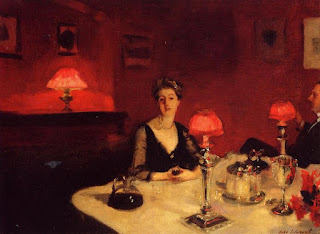Tuesday, March 9, 2021
Pesachim 103 - Havdallah
Monday, March 8, 2021
Pesachim 102 - Rules and exceptions
If people started eating in one house and then moved to another one, all agree that one needs to say another blessing. But if they move from one room to another, they do not need to say another blessing in the next room.
This rule is simple enough; the problem is that some people have a different reading of their text, and it says "when they move from one corner to another." This reading assumes that you still see your previous table. If you move from a room to another room, you do say a new blessing in the next room. Complicated as this discussion is, it is actually the accepted law, and one says a new blessing.
However, there is an exception to this ruling as well: it depends on what food they eat and what blessing follows. These rules, with the accompanying discussions, will bear relevance to eating at the Seder.
Art: A Breakfast Table by John Singer Sargent
Sunday, March 7, 2021
Pesachim 101 - New place, new blessing
Some say that the Kiddush must be in the same place where the meal will be, or else it is not a Kiddush at all. If so, what is the purpose of the Kiddush in the synagogue? - Sometimes, there will be guests in the synagogue who will stay and eat there, and it is for them.
We see, therefore, that a place plays an important role. Abaye has a story to confirm this. When he was a student in the academy of Rabbah, and Rabbah would say a Kiddush for everyone - the students wanted to leave and go to their homes. Rabbah would tell them, "Please eat something! - Lest, your lamp will be extinguished, and you will not make a Kiddush at home." Rabbah's Kiddush did not count for them - because Kiddush must be in the same place where the Shabbat meal will be held.
Art: Dinner table at night by John Singer Sargent
Saturday, March 6, 2021
Pesachim 100 - Continue the meal
Thursday, March 4, 2021
Pesachim 99 - No eating till evening
Even the poorest among the Jews should eat while reclining, imitating rich and free people. Some say that he should recline during the first two wine cups while discussing being a slave, and some - that he should recline during the last two wine cups while discussing becoming free. To fulfill both views, he reclines for all four cups.
All should have four cups of wine. Even the poorest person supplied with the communal charity has to be provided with four cups of wine.
Art: Young Wine Taster by Philippe Mercier
Tuesday, March 2, 2021
Pesachim 98 - A lost sheep
Another problem: a group of people lost their Passover sheep. They made one of them a messenger to find it. He found it and slaughtered it for them. But they, being afraid that he won't find the animal, got another one and slaughtered it. Which one do they eat now?
The answer: if he slaughtered his first, then it is the group's offering, and all eat from it. If they slaughtered theirs first, they eat the new one, but the messenger eats the original one because he slaughtered it for himself. What if they do not know which one was slaughtered first? He still eats his, but they cannot eat any because they do not know which one is theirs. However, since one of the two is definitely theirs - it's just that they don't know which - they fulfilled the mitzvah and do not bring it on Second Passover.
Now there is a whole group of attempts to rectify this situation by making all kinds of conditions, but none works in all life situations. The conclusion is that it is better to be silent and not fix it with all kinds of clauses.
Art: A shepherd with his flock by Anton Mauve
Monday, March 1, 2021
Pesachim 97 - The sheep goes to graze
What if someone designated a lamb and then died? The offering goes as an inheritance to his son. If the son was not registered to eat this offering, he cannot eat it this year, but he also cannot eat it the next year because by then, the lamb will be over a year old! Therefore, the son will later bring this animal as a peace offering.
Art: Grazing sheep by Carleton Wiggins







